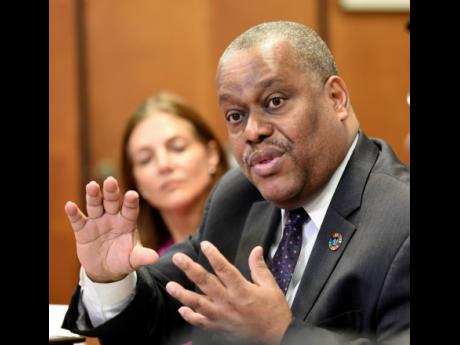Global financing woes pressuring HIV response
United Nations resident coordinator Dr Garry Conille has raised alarm that global fiscal challenges were putting HIV/AIDS intervention at risk.
The coronavirus pandemic has been cited as one of a slew of factors suppressing donations.
“Fortunately for us, we have real serious advocates and partners that are committed to making sure that funding for HIV/AIDS does not go down. This is one of the purposes of visits like the ones we have today – to be able to remind governments, to remind stakeholders, private sector and individuals, that despite the big progress we have made in HIV/AIDS, millions are affected each year and we cannot let our guard down,” he said in a Gleaner interview on Tuesday.
Winifred Byanyima, undersecretary general and executive director of the Joint United Nations Programme for HIV/AIDS (UNAIDS), is on a visit to the country from November 6 to 11.
UNAIDS, in its recent report IN DANGER, warned that financing threats could further undermine the response in increasingly strained economies.
The 371-page report outlined that progress is slowing as resources available for HIV in low- and middle-income countries have declined, leaving their HIV response US$8 billion short of the amount needed by 2025.
“Many major bilateral donors are reducing international assistance for AIDS. Meanwhile, low- and middle-income countries struggle under the greater fiscal burdens caused by the COVID-19 pandemic,” the report read in part.
The World Bank has also projected that 52 countries, home to 43 per cent of people living with HIV, will experience a significant drop in public spending capacity through to 2026.
“A key component to responding to this disease is access to services, and these services obviously have a cost. In countries like ours, because of the limitations or fiscal space, it is often very difficult for the government to make choices. Do I invest in education, or health? Do I build a road or a school?” Conille said.
Meanwhile, UNAIDS multi-country director Dr Richard Amenyah endorsed community-led responses as crucial in the fight against HIV/AIDS.
He said the Jamaican Network of Seropositives (JN+) is driving the frontiers of community-led monitoring.
“As UNAIDS, we are working with civil society to develop community-led monitoring strategies, because when COVID-19 struck, we used the lessons in HIV to support community responses and, through that, Global Fund and PEPFAR are investing and supporting civil society to ensure that communities are the centre of the response,” he said.
Amenyah added that JN+ is working to ensure that treatment is brought to the doorsteps of people and engages those who have fallen off track with their regimen.
“Taking medication is a challenge, even though it is one pill a day. Some people become fatigued, in terms of taking medication every day, and so they encourage to get adherence,” Amenyah said.

